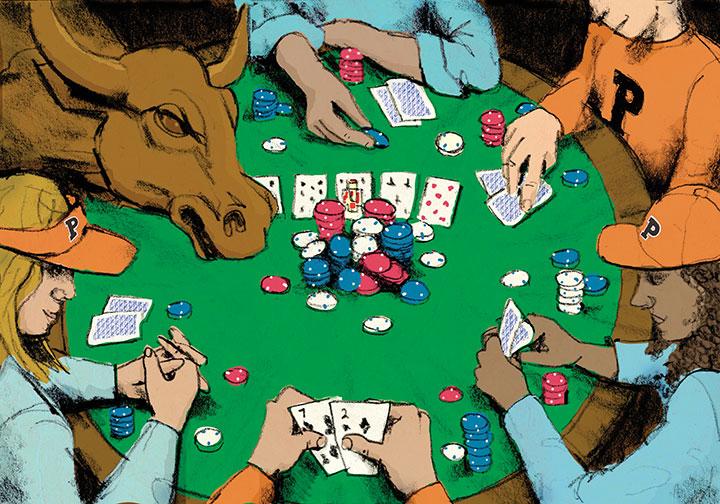
 When the Princeton chapter of the Global Poker Strategic Thinking Society was founded in 2008, online poker’s popularity was at its height.
When the Princeton chapter of the Global Poker Strategic Thinking Society was founded in 2008, online poker’s popularity was at its height.
In 2003, accountant Chris Moneymaker made headlines as the first person to win the World Series of Poker (and $2.5 million) by entering through an online qualifier game. Following his win, amateur players — including Princeton students — flocked to online poker sites. (Matt Hawrilenko ’04 even won a 2009 World Series of Poker event.) The online craze subsided in 2011, when three poker sites were charged with violating gambling laws and were temporarily shut down, and the poker society’s popularity similarly declined.
This year, however, the group’s new officers are working to revitalize the club and change the campus perception of poker from a risky financial endeavor to a game of skill-based decision-making and mathematical beauty.
“Poker is really a beautiful game, because it’s very difficult to master,” said Daniel Kim ’18, a math major. “To get good at it you have to not only manage risk but also read people, [which] involves math, psychology, and quantitative reasoning.” Unsurprisingly, the 60 to 70 students who show up at each tournament tend to be engineering, math, and psychology majors.
“There are a lot of great skills poker can teach you that help in a job like finance,” said chapter president Bradley Snider ’17. That may be the reason quantitative-trading companies like Susquehanna International Group and 3Red often sponsor tournaments, and even offer winners a chance to interview at their firms.
There’s no actual gambling in the chapter’s tournaments. While most carry a cash prize, students play with chips and not real money. The group receives University support through the Alcohol Initiative board, which funds alcohol-free social events.
Unlike casino games like blackjack, which are skewed toward the house, poker players face each other. That makes poker inherently a game of skill and not of chance, Snider said. The club hosts casual play and strategy sessions, including talks by academic researchers studying poker theory.
At the end of the day, though, most of the students in the club are there to have fun. Poker is a way to “relax and de-stress,” Kim said — but with the added advantage that it “ultimately can benefit you in your career.”
Photo: courtesy Tammy Tseng ’18
